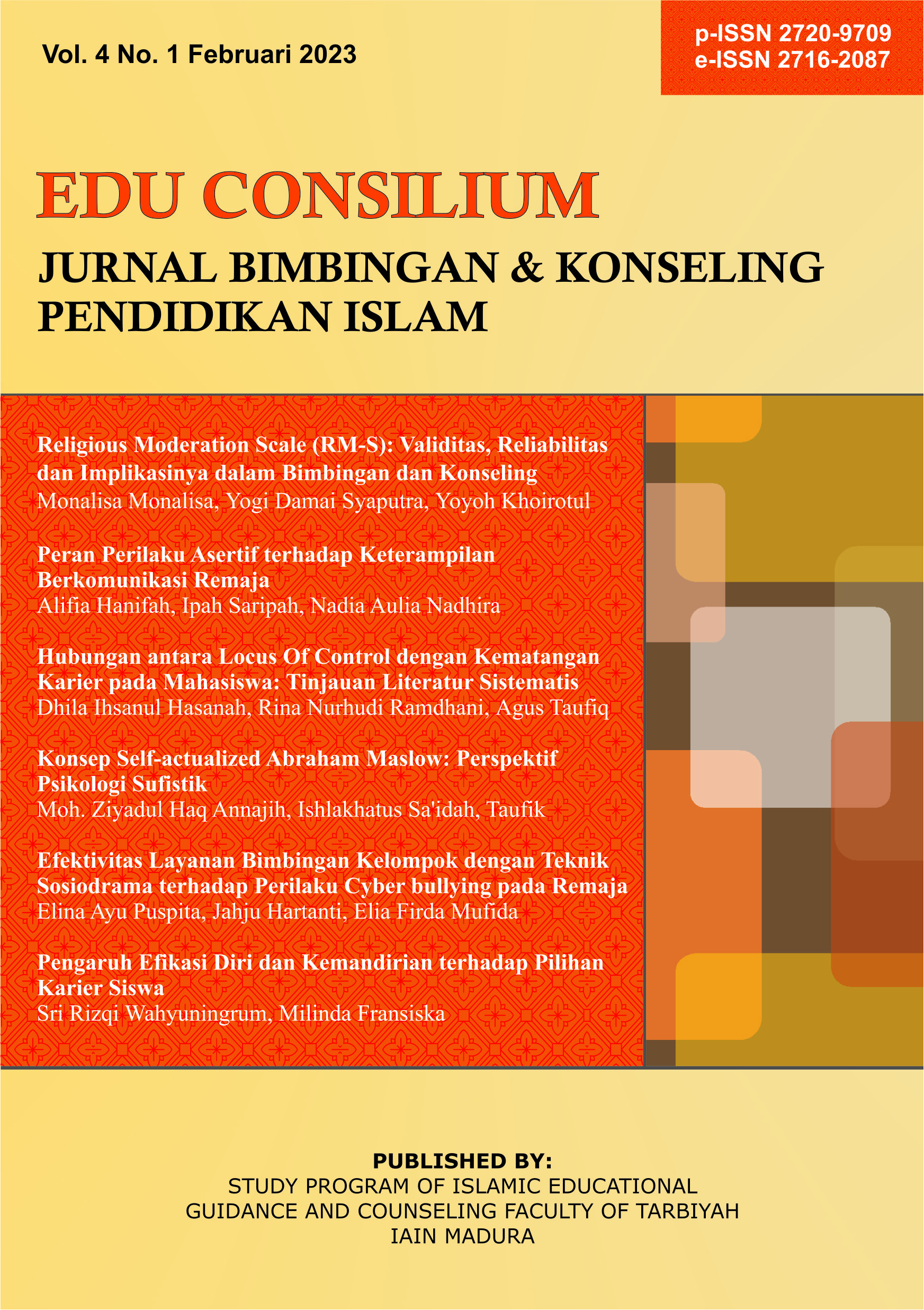Peran Perilaku Asertif terhadap Keterampilan Berkomunikasi Remaja
 Abstract views: 1085
,
Abstract views: 1085
,
 PDF downloads: 1633
PDF downloads: 1633
Abstract
The research aimed to know how the role of assertive behavior on adolescent communication skills. In the development of adolescent the ability to express about theirself directly and their feelings honestly is very important. Adolescents tend to prefer to follow the decisions of their peer group and put aside personal interest. This will certainly have a negative impact if it occurs continously because it can affect their future lives. The method used in this study is a literature study approach by reviewing and analyzing several national and international journals regarding the dynamics of assertive behavior and its role in adolescents’s skill of communication. Based on the results of the descriptive analysis, it was found that the dynamics of assertive behavior has a role that influences each other with adolescent’s skill in communication.
Downloads
References
Abidin, Z. (2011). Pengaruh pelatihan resiliensi terhadap perilaku asertif pada remaja. Jurnal Pamator, Volume 4(No 2), 129–136.
Alberti, R., & Michael, E. (2017). Your Perfect Right: Assertiveness and Equality in Your Life and Relationships (Temth edit). New Harbinger Publications, Inc.
Ampuno, S. (2020). Perilaku asertif generasi milenial dalam perspektif psikologi islam. JIVA: Journal of Behaviour and Mental Health, 1(1).
Aryani, F. (2022). KETERAMPILAN ASERTIF UNTUK REMAJA.
Belinda, M. G., & Savitri, L. S. Y. (2021). Keterampilan menolak secara asertif pada kelompok remaja yang mengalami tekanan negatif teman sebaya: pelatihan daring selama pandemi Covid-19. PSIKODIMENSIA, 20(1), 1-9.
Christian, C. V., & Jatmika, D. (2018). Pengaruh Persepsi Komunikasi Efektif Dengan Orang Tua Terhadap Kecenderungan Kenakalan Remaja Di Sma X Jakarta. Jurnal Psikologi Ulayat, 5(2), 157–168. https://doi.org/10.24854/jpu02018-137
Conrad, & Suzanne, P. (2013). Assertiveness How to be Strong in Every Situation. Capstone Publishing Ltd. https://www.ptonline.com/articles/how-to-get-better-mfi-results
Dewantari, T., Surya, B. H., & Bulantika, S. Z. (2021). Group Counseling with Assertive Training Techniques to Self Confidence Adolescents. Jurnal Kependidikan: Jurnal Hasil Penelitian Dan Kajian Kepustakaan Di Bidang Pendidikan, Pengajaran Dan Pembelajaran, 7(1), 35. https://doi.org/10.33394/jk.v7i1.3317
Dinata Andari Nursa, Murtini, Safaria, T. (2019). Peran Peer Acceptance dan Perilaku Assertif pada Keterampilan Sosial Remaja. Prosiding Seminar Nasional Magister Psikologi Universitas Ahmad Dahlan, 327–334. http://seminar.uad.ac.id/index.php/snmpuad/article/download/3444/774
Endang Mei Yunalia, A. N. E. (2019). Efektivitas Terapi Kelompok Assertiveness Training Terhadap Effectiveness of Assertiveness Training Group Therapy on Assertiveness Communication Skills in Adolescents with Aggresive Behaviour. Keywords : assertiveness training , assertiveness communicatio. 7(3), 229–236.
Hafizhah, N. (2020). Dinamika Perilaku Asertif Remaja (Studi tentang Bentuk dan Faktor yang memengaruhi Perilaku Asertif) (Doctoral dissertation, Universitas Hasanuddin).
Hargie, O. (2021). Skilled Interpersonal Communication: Research, theory and practice. In Skilled Interpersonal Communication: Research, Theory and Practice. https://doi.org/10.4324/9781003182269
Hikmah, N. (2020). Perilaku Asertif Dalam Perspektif Islam. Liwaul Dakwah : Jurnal Kajian Dakwah Dan Masyarakat Islam, 10(1), 101–114. https://ejurnal.iainlhokseumawe.ac.id/index.php/liwaul-dakwah/article/view/988
Hurlock, E. (1980). Psikologi Perkembangan: Suatu Pendekatan Sepanjang Rentang Kehidupan (Kelima). Erlangga.
Husnah, S., Wahyuni, E., & Fridani, L. (2022). Gambaran Perilaku Asertif Siswa Sekolah Menengah Atas. Edukatif : Jurnal Ilmu Pendidikan, 4(1), 1370–1377. https://doi.org/10.31004/edukatif.v4i1.1858
Khairul Anuar Rusli, Mohd Azrin Mohd Nasir, & Nurashikin Amir Hamzah. (2011). Relationship Between Interpersonal Communication Competence and Students’ Assertive Behaviour. Journal of Human Capital Development (JHCD), 4(1), 25–33.
Khairunnisa, H., & Putri, A. A. H. (2019). Relationship of Assertive Behaviors and Social Media Addiction among Adolescents. 304(Acpch 2018), 109–112. https://doi.org/10.2991/acpch-18.2019.28
Kusumawaty, I., Yunike, Y., & Ni Ketut, S. (2021). Relationship between Assertive Communication and Cyber-bullying in Adolescents. Jurnal Kedokteran Brawijaya, 31(4), 7. https://doi.org/10.21776/ub.jkb.2021.031.04.7
Lazarus, A. A. (1973). On Assertive Behavior: A Brief Note. Behavior Therapy, 4, 697-699. DOI: https://doi.org/10.1016/S0005-7894(73)80161-3
Mataputun, Y., & Saud, H. (2020). Analisis komunikasi interpersonal dan penyesuaian diri remaja. Jurnal Konseling Dan Pendidikan, 8(1), 32–37. https://doi.org/10.29210/140800
Muthohharoh. (2016). Efektifitas Layanan Konseling Kelompok dengan Teknik Latihan Asertif untuk Meningkatkan Keterampilan Komunikasi Interpersonal Siswa. Jurnal Penelitian Bimbingan Dan Konseling, 1(2), 90–103. https://jurnal.untirta.ac.id/index.php/JPBK/article/view/1868
Ngatini, N., & Karneli, Y. (2021). Tingkat perilaku asertif siswa dan implikasi dalam pelaksanaan layanan bimbingan konseling. Counsenesia Indonesian Journal Of Guidance and Counseling, 2(1), 72-81.
Parray, Waqar M., & Kumar, S. (2017). Assertiveness Among Undergraduate Students of the University. The International Journal of Indian Psychology, Volume 4,(1), 10.
Pasaribu, W. C., Yusmansyah, Y., & Mayasari, S. (2019). Peningkatan Komunikasi Interpersonal Menggunakan Layanan Konseling Kelompok Teknik Assertive Training. ALIBKIN (Jurnal Bimbingan Konseling), 7(2).
Paterson, R. (2000). The Assertiveness Workbook: How to Express Your Ideas and Stand Up for Yourself at Work and in Relationships. Oakland: New Harbinger Publications, Inc.
Pipaş, M. D., & Jaradat, M. (2010). Assertive Communication Skills. Annales Universitatis Apulensis Series Oeconomica, 2(12), 649–656. https://doi.org/10.29302/oeconomica.2010.12.2.17
Putri, A. P., & Wahyuningrum, S. R. (2021). Efektivitas Bimbingan Kelompok untuk Meningkatkan Keterampilan Komunikasi Siswa SMK dengan Teknik Assertive Training. Edu Consilium: Jurnal Bimbingan Dan Konseling Pendidikan Islam, 2(1), 36–47. https://doi.org/10.19105/ec.v2i1.4268
Putri, N. (2017). Pelaksanaan Teknik Sertif untuk Meningkatkan Perilaku Asertif Siswa di SMPN 2 Banda Aceh. Jurnal Ilmiah Mahasiswa Bimbingan Dan Konseling, 2(3), 65–72.
Robert, B. (1979). Peolple Skill How to Assert Yourself, Listen to Others, and Resolve Conflicts. Simon & Schuster, Inc.
Rohyati, E., & Purwandari, Y. H. (2015). Perilaku Asertif Pada Remaja. In Psikologi (Vol. 11, Issue 18583970, pp. 1–11).
Sa’idah, I., & Radjah, C. L. (2019). PAKET PERMAINAN INTERAKSI SOSIAL. WINEKA MEDIA.
Saidah, I. (2016). Pengembangan Paket Interaksi Sosial Untuk Siswa Sekolah menengah (Doctoral dissertation, State University of Surabaya).
Stephanie, H., & Claire, W. (1990). Assertiveness: A Practical Approach. Routledge.
Wahyu, A. D., & Muslikah. (2019). Hubungan antara konsep diri dengan perilaku asertif siswa kelas XI. Jurnal Bimbingan Konseling, 5(2), 168–182.
Wazira, S. H., & Sa'idah, I. (2022). Pengaruh Teknik Analisis Transaksional untuk Meningkatkan Kemampuan Interaksi Sosial Siswa. Edu Consilium: Jurnal Bimbingan dan Konseling Pendidikan Islam, 3(2), 56-68. https://doi.org/10.19105/ec.v3i2.6719
West, R., & Turner, L. (2021). Introducing Communication Theory Analysis Application. In McGraw-Hill Education.
Wijayanti, E. Y. (2022). Meningkatkan Perilaku Asertif Peserta Didik Melalui Layanan Bimbingan Klasikal Dengan Metode Psikodrama. AL-TARBIYAH: Jurnal Pendidikan (The Educational Journal), 32(1), 24. https://doi.org/10.24235/ath.v32i1.10619
Yuliani, E. M., Etika, A. N., Suharto, I. P. S., & Nurseskasatmata, S. E. (2020). Analysis of Assertive Communication Skills in Adolescents Health With Aggressive Behavior. 473(Icss), 232–236. https://doi.org/10.2991/assehr.k.201014.050
Zulhadi, R., Marwinda, M., & Masril, M. (2023). Pengaruh Konseling Kelompok Teknik Asertif Dalam Meningkatkan Keterampilan Komunikasi Interpersonal Siswa Kelas X di SMA 1 Dua Koto. Jurnal Pendidikan dan Konseling (JPDK), 5(1), 2386-2392.
The journal operates an Open Access policy under a Creative Commons Non-Commercial 4.0 International license. Authors who publish with this journal agree to the following terms:
- Authors retain copyright and grant the journal right of first publication with the work simultaneously licensed under a
 Commons Attribution-NonCommercial 4.0 International License
Commons Attribution-NonCommercial 4.0 International Licensethat allows others to share — copy and redistribute the material in any medium or format, and adapt — remix, transform, and build upon the material.
- Authors are able to enter into separate, additional contractual arrangements for the non-exclusive distribution of the journal's published version of the work (e.g., post it to an institutional repository or publish it in a book), with an acknowledgement of its initial publication in this journal.
- Authors are permitted and encouraged to post their work online (e.g., in institutional repositories or on their website) prior to and during the submission process, as it can lead to productive exchanges, as well as earlier and greater citation of published work (see The Effect of Open Access).




















